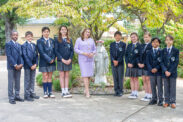Atlanta
New family formation program supports the ‘domestic church’
By SAMANTHA SMITH, Staff Writer | Published October 1, 2020
ATLANTA—Virtual slideshows with videos and activities greeted parents and their children this fall semester as part of a new parish religious education program.
“Families Forming Disciples,” created by the Office of Formation and Discipleship for the Archdiocese of Atlanta, is designed to help families encounter the Lord together as a “domestic church” at home.
The program “seeks to gather families together guided by their parish leaders so they can help and encourage one another,” said Archbishop Gregory J. Hartmayer, OFM Conv. It’s designed with two goals in mind: to help families grow closer to the Lord and to bring families closer to one another, said the archbishop.
 In-person classes for parish religious education came to a halt in March due to the coronavirus pandemic. “Families Forming Disciples” is one of the many ways the Office of Formation and Discipleship increased support for parish catechetical leaders while helping families navigate a new religious education model.
In-person classes for parish religious education came to a halt in March due to the coronavirus pandemic. “Families Forming Disciples” is one of the many ways the Office of Formation and Discipleship increased support for parish catechetical leaders while helping families navigate a new religious education model.
With this new program, “parents are supported in sharing their faith in their homes and in cultivating prayer and a deeper relationship with the Lord—all of which is especially important during this time of COVID-19,” said Archbishop Hartmayer.
Faith at home
Realizing parishes would need more support amid the pandemic, work began on creating “Families Forming Disciples” in late spring.
This was going to be a very unique year, said Patrice Spirou, regional associate director of faith formation.
“But instead of looking at it as having a lot of obstacles we could look at it as having some great opportunities for starting to promote family faith formation,” she said.
Most parish religious education programs focus on teaching students by grade. The family faith formation model incorporates everyone living at home—parents or guardians, children and even grandparents.
With 27 weeks of instruction, the program includes prayer, videos, reflections and mission activities for families to complete together at home. Lessons follow the liturgical calendar and invite parish families to gather and share their experiences.
This hybrid program can be used virtually or for in-person gatherings.
“The program that we’ve written is super easy that you could use it in-person, or you could use it virtually or you can do a little bit of both,” said Spirou.
If parishes meeting in-person have to transition to online learning, they can switch easily without missing a beat and vice versa, explained Spirou. There’s a lot of flexibility because each parish is going to do their own thing, she said.
With her background in teaching, education and theology, Spirou was able to write lessons for the program. This team effort by the Office of Formation of Discipleship also included editing, graphic design and Spanish translations.
Once a set of lessons is completed, virtual training is given to parish catechetical leaders. This allows them to ask questions and build community with one another and exchange ideas. Virtual trainings are recorded and available online.
A model for the future
Moving towards family faith formation was part of the Archdiocese of Atlanta Pastoral Plan released in 2014.
“All family members need ongoing opportunities to learn more about and deepen their understanding of their rich Catholic faith, whatever their age or state of life,” the Pastoral Plan states. “There is wonderful work being done in our parish schools of religion and Catholic Schools with our youth, but we must recognize that it is in the family where those lessons must begin and then be sustained, reinforced and lived.”
About 35% of parishes in the Archdiocese of Atlanta are using a family faith formation model, with 25% of those using the “Families Forming Disciples” program and 10% using their own model.
People from dioceses in other states and countries reached out to us about the program because we presented it at this year’s Atlanta Catechist Conference, said Spirou. This is the direction our country is going in, she said.
Learning new technology was one of the biggest challenges of the program. It’s been a learning curve for everybody, our team included, said Spirou. With some catechists not serving this year, lacking confidence they could handle the technology, new people were recruited. And with each parish having unique practices, a lot of variety was incorporated into the program.
However, Spirou feels these challenges are minor compared to the opportunities of the new program.
This is an opportunity for parents to learn their faith again in a non-threatening way and enriches the family faith life, said Spirou.
“It brings us closer to God and it brings us closer to each other,” she said.


